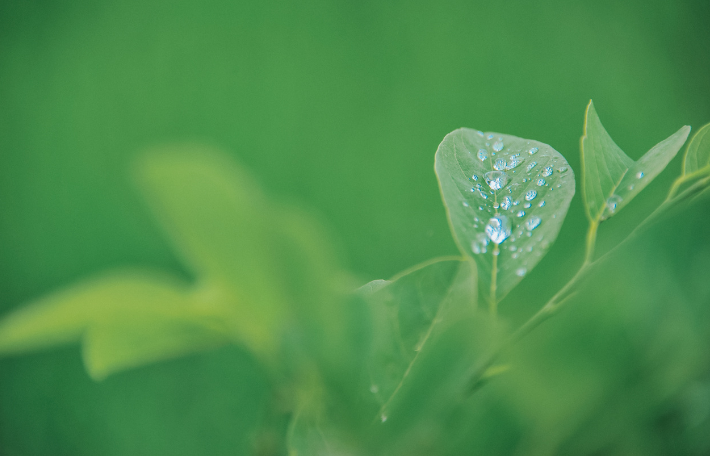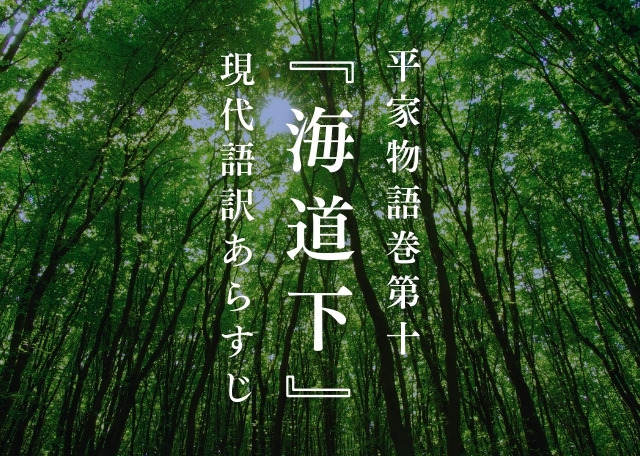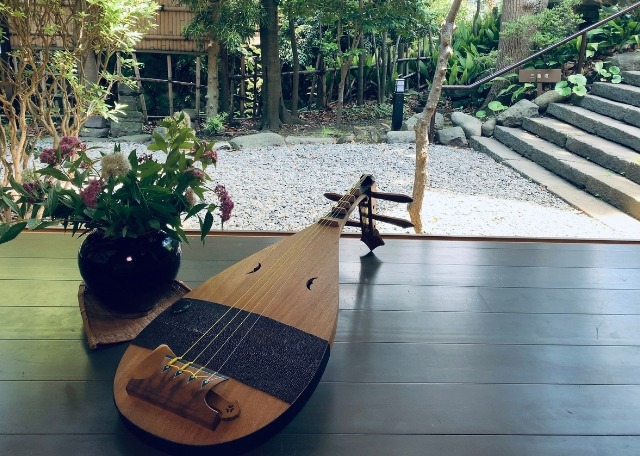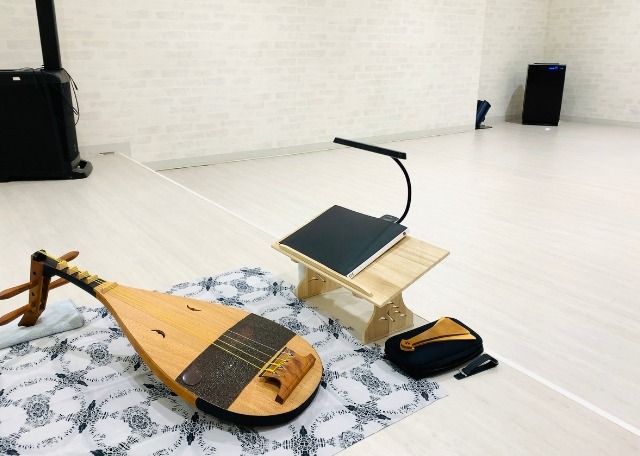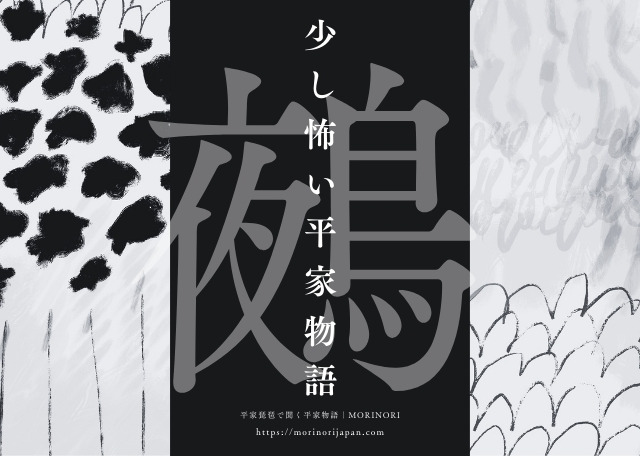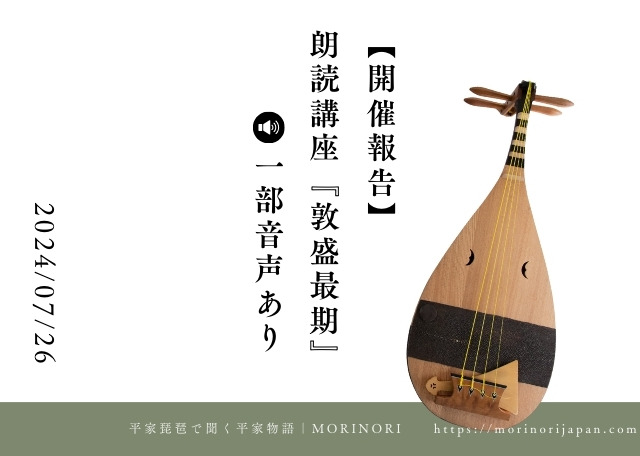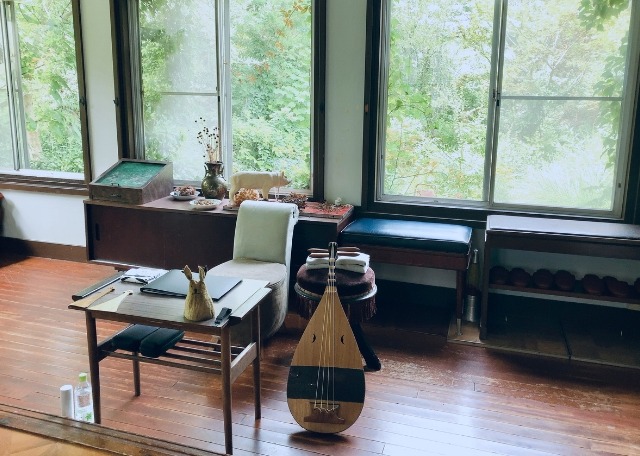目次
Voice Introduction.
Listen to the contents of this page in MORINORI’s voice
*Please note the volume
Today, we would like to report that the small concert “Songs of That Person” scheduled for Tuesday, August 13th has been cancelled. Following the announcement of a possible Nankai Trough earthquake on August 9th, we have decided to cancel the concert scheduled for August 13th. We are very sorry for the inconvenience this may cause, but we have come to this decision as the warning is expected to continue for about a week. We would like to express our sincere apologies for any inconvenience caused to those involved.
At present, the “Songs of That Person” concerts in September and October are still scheduled to take place. Please understand that this may change depending on the situation.
The “Songs of That Person” concert in September will feature the Heikyoku “Yokobue”.
https://morinorijapan.com/lecture-and-performance/20240910
The October “Songs of That Person” will be the Heikyoku “Kaidoukudari”.
https://morinorijapan.com/lecture-and-performance/20241008
No advance registration is required for either event. Please come directly to the venue.
Report on the event that was not held
Tuesday, August 13th: Songs of That Person
Heikyoku “Ichimonmiyakoochi
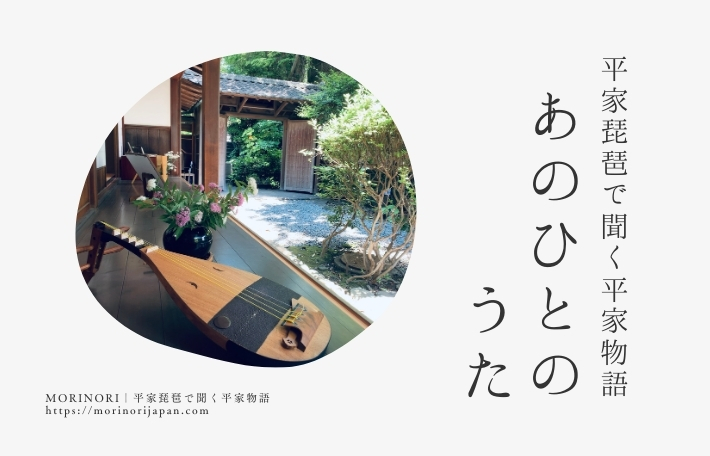
The performance scheduled for August 13th was “Ichimonmiyakoochi
Songs of That Person” is a small 15-20 minute performance in which the songs from the Heike Monogatari are recited to the accompaniment of the Heike biwa. The “Songs of That Person” performance scheduled for August 13th was “Ichimonmiyakoochi”. The Heike clan were going to tell two songs, one by Heike no Nakanojo Norimori, “The ephemeral master leaves for the clouds, and the smoke rises from the inn”, and one by Shuri no taifu Tsunemori, “Looking back on the burnt fields of my hometown, I walk along the path of smoke”.
This Heikyoku piece, “Ichimonmiyakoochi”, is a story that we always recite aloud during the Bon and equinoctial holidays. When you think about the sadness of the Heike clan setting fire to their own homes and leaving the capital behind, it makes your heart tighten.
In Ichimonmiyakoochi, after the names of the Heike clan members who are leaving the capital are read out, Taira no Tokitada prays, “NAMUKIMYOUHACHIMANDAIBOSATSU I pray that you will allow us to return to our homeland once more, starting with you, my lord.Looking behind, they see a thin column of smoke rising from the burnt fields. Seeing this, Taira no Nakanojo Norimori composes the poem “How fleeting is the master’s departure to the heavens, and how the smoke rises from the ruins of his home”, and Shuri no taifu Tsunemori composes the poem “Looking back on the burnt fields that were once our homeland, even now the smoke rises from the path of our exile”.
The Heike clan were unable to return to their homeland together after this, but I hope that by reciting Heikyoku at Obon and Higan, the feelings of the
Sound:
From the Heikyoku “Ichimonmiyakoochi”
Hiranaka no Nagonori MORI “If the Lord of the ephemeral world departs to the clouds, the smoke of his home will rise up”
Shuri no taifu Tsunemori “Looking back on my hometown as a burnt field, I will continue on my journey, the waves of smoke”
*Please be careful of the volume.
Time: 3 minutes 16 seconds
Recording: August 12, 2024
Next time
Tuesday, September 10
Songs of That Person|Heikyoku “Yokobue
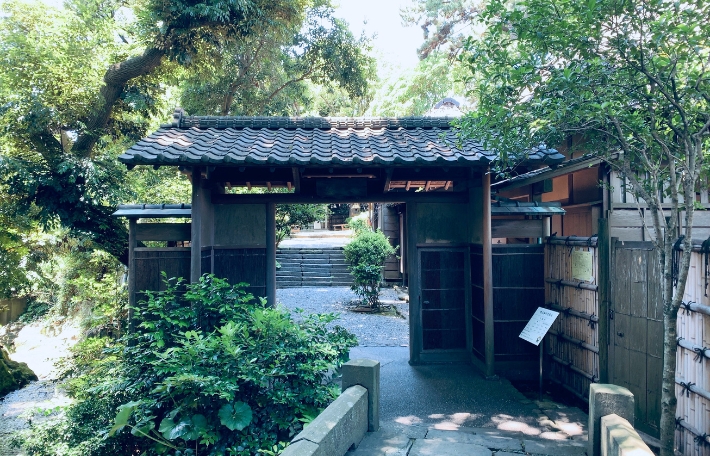
From the Heike Monogatari, Volume 10, “Yokobue
”Until I was shaved, I had nothing but resentment, but now I am on the true path of the Azusa-yumi, and I am happy.“
”Even if I am shaved, I have nothing but resentment. If I am to continue playing the Azusa-yumi, I must have the heart to do so.”
Summary of the Tale of the Heike, Volume 10, “Yokobue
TairanoKoremori’s thoughts turn to his family back in the capital, and he secretly slips away from Yashima, where the Heike clan are staying. However, he struggles with the idea that he must not go to the capital and be captured, and heads for Koyasan. There he met Takiguchi Nyudo (Saito Takiguchi Tokiyori), a man who had once loved a woman called Yokobue, but who had gone on to become a Buddhist priest after his family opposed their relationship.
Full modern translation of “Yokobue”
https://morinorijapan.com/tale-of-the-heike/yokobue-nachinookinite
About the concert
In the October “Songs of That Person” performance, we will be telling the story of the scene in the Heike Monogatari (Tale of the Heike) where Takiguchi Nyudo sends a song to Yokobue, who has become a Buddhist priest, from the tenth volume of the Heike Monogatari, “Yokobue”. “I am happy to be on the path of the Azusa bow, even though I have resentment until I am shaved.” The reply from Yokobue is ‘Even if I am shaved, I have no resentment. If I do not have the heart to stop playing the Azusa bow, then I should not be playing it.’ These two songs are told with the accompaniment of Heike biwa.
This concert is a small performance lasting 15 to 20 minutes, featuring only the singing. The venue (waiting room) will open at 10:30, but Shigitatsuan will open at 9:00, so you may hear some of the sounds and voices of the performers preparing. Please note that the concert may be subject to change due to weather or disaster warnings. We apologize for any inconvenience.

Event Date and Time Information
Songs of That Person|The Tale of the Heike, Vol. 10 “Yokobue”
Date: Tuesday, September 10, 2024
Time: 10:40 – 11:00 (Doors open at 10:30)
*The performance will last for about 15 minutes.
Program: The Tale of the Heike, Vol. 10 “Yokobue”
Type: Concert (After a short modern-language translation and commentary at the beginning, the performance will begin.
Admission: Free
There is an admission fee (110 yen for residents of the town, 310 yen for non-residents)
Application: Not required (please come directly to the venue)
Venue
Ooisomachi Shigitatsuan (designated tangible cultural property of Ooisomachi)
1289 Oiso, Ooisomachi, Nakagun, Kanagawa Prefecture
7-minute walk from JR Oiso Station
https://www.nem-shiteikanri.jp/shisetsu/shigitatsuan/index.html
Ooisomachi Shigitatsuan
This is the place where Saigyo, a poet from the end of the Heian period, is said to have composed the poem “Even my heartless body knows the pathos of the autumn dusk in Shigitatsuzawa” while wandering around the coast of Oiso. Shigitatsuan was founded in the early Edo period by Sōsetsu of Odawara, who erected a stone monument at Shigitatsuzawa and built a thatched hut there, transporting a stone statue of the Five Wisdom Buddhas. It is one of Japan’s three great haikai training centers, and has been in existence for over 300 years.
I look forward to seeing you at the venue.

